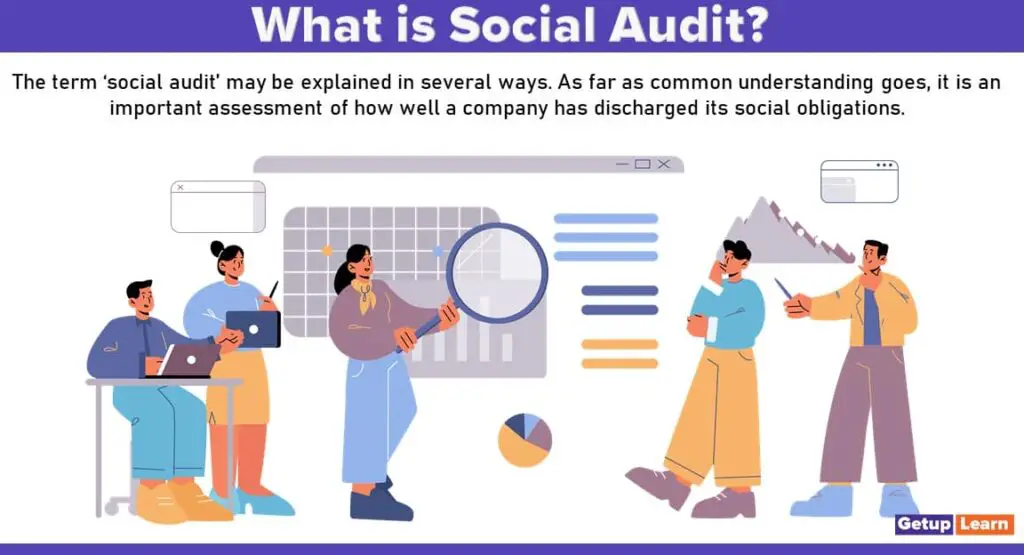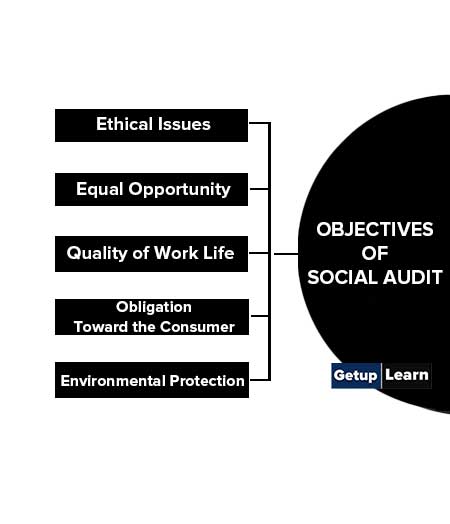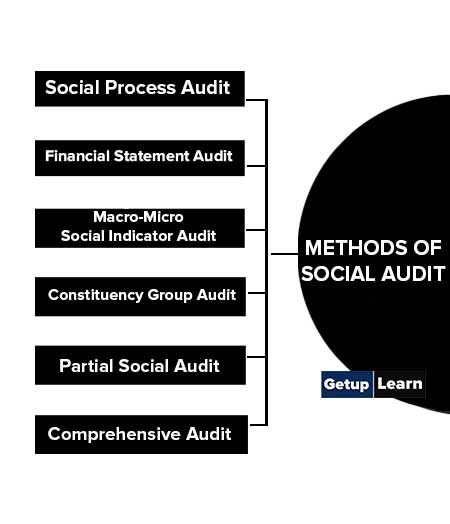Table of Contents
The term ‘social audit’ may be explained in several ways. As far as common understanding goes, it is an important assessment of how well a company has discharged its social obligations.
However, experts see it as a systematic and comprehensive evaluation of a company’s social performance’ which is explained as a company’s efforts in enriching the general welfare of the whole community and the whole society.

Or to be more precise the importance or the need for a social audit is to measure the works of the companies in terms of the social welfare of the society. The aim of social audit is To identify the working style and works of the companies which do impact society.
The social cost-benefit analysis, gain and loss barometer for the society, and to measure it. To amplify it to the customers, the shareholders and every interested party of the company so that it can be marketed or informed that this company is doing for society.
The followings are the objectives of a social audit:
- Ethical Issues
- Equal Opportunity
- Quality of Work Life
- Obligation Toward the Consumer
- Environmental Protection

Ethical Issues
Social audits offer a basis for determining what is right and what is wrong in terms of a given situation. Ethics is best realized when we cite examples relating to unethical conduct. Few such examples can be price discrimination, unfair trade practices, pirating employees’ ideas, cheating customers, and leaving the job without observing the job contract.
Equal Opportunity
A second relevant social issue that comes under social audit is the equity opportunity in employment and a fair justice system in the firm. Employment decisions in an organization should be based on merit and ability and not on the basis of random quotas based on gender, race, or religion.
Quality of Work Life
Besides demands for a safe, healthy, and human work environment people are seeking greater means of their lives. Greater responsibility, freedom, growth and flexibility, fair reward system are a few things that employees have a preference for. There is also a growing demand for employee assistance programs keeping in mind the present-day difficult situations they are exposed to.
Obligation Toward the Consumer
The business has a special obligation toward the consumer as the business exists to serve and satisfy the needs of the customers. It is the principal duty of business to provide the consumer items of daily needs in the right quantity at the right time, price, or of the right quality. However many Indian products are not safe at all and many consumers suffer at hands of corrupt, and dishonest corporate houses.
Environmental Protection
Growing water, air, and environmental pollution by various industries in recent times leads to a public outcry demanding ‘environmental protection’ at any cost.
The various methods of social audit may be listed below:
- Social Process Audit
- Financial Statement Audit
- Macro-Micro Social Indicator Audit
- Constituency Group Audit
- Partial Social Audit
- Comprehensive Audit

This audit is also known as a Programme management audit which in short says that the company first defines the work field where it wants to work and what to work for? Then the cost or benefit analysis of that work and feasibility also. Then the management or monitoring of that work being done by the company and finally to see whether these goals have been met or not.
Financial Statement Audit
This is a complicated social audit like a financial audit. This is presented in a way of the balance sheet as financial statements are usually kept for the record.
Micro indicators mean the goals of companies or the work done by the companies (health, education, safety, housing, pollution control measures, accidents etc.) are how much going with the macro indicators which are major goals and policies set by the country or the government.
Constituency Group Audit
This is like a political constituency satisfaction test. In this audit needs and preferences of every stakeholder of the company are collected and then it is compared with the work done by the company and evaluated what has been done for every stakeholder.
This method of a social audit just measures the particular aspect of the social work done by any company. Energy conservation etc.
Comprehensive Audit
This type of audit measures the full performance of the organization with the social audit.
The term ‘social audit’ may be explained in several ways. As far as common understanding goes, it is an important assessment of how well a company has discharged its social obligations. However, experts see it as a systematic and comprehensive evaluation of a company’s social performance’ which is explained as a company’s efforts in enriching the general welfare of the whole community and the whole society.
The various methods of social audit may be listed below:
1. Social Process Audit
2. Financial Statement Audit
3. Macro-Micro Social Indicator Audit
4. Constituency Group Audit
5. Comprehensive Audit
There are various problems in measuring social audits. Some of the followings are given below:
1. It’s a new concept and yet to take off in the studies.
2. No clarification is made as to what to be included in the social audit? and what not to?
3. There are many activities, which cannot be evaluated instantly, or evaluated qualitatively but cannot be converted into monetary terms like national income calculation.
The followings are the objectives of a social audit:
1. Ethical Issues: Social audits offer a basis for determining what is right and what is wrong in terms of a given situation.
2. Equal Opportunity: A second relevant social issue that comes under social audit is the equity opportunity in employment and a fair justice system in the firm.
3. Quality of Work Life: Besides demands for a safe, healthy, and human work environment people are seeking greater means of their lives.
4. Obligation Toward the Consumer: To provide the consumer items of daily needs in the right quantity at the right time, price, or of the right quality.
5. Environmental Protection















